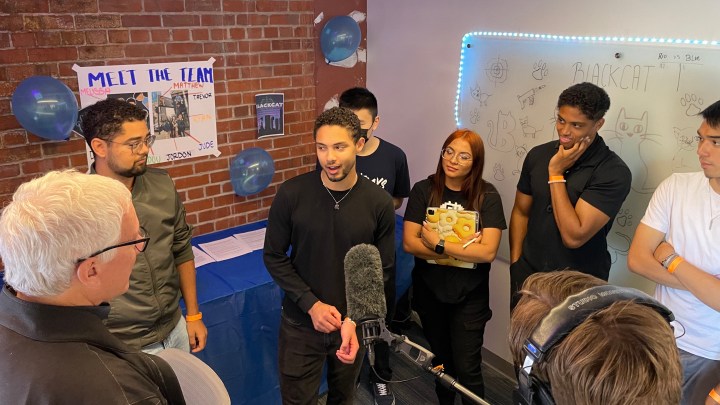
Up-and-coming video game developers share their dream jobs
Up-and-coming video game developers share their dream jobs

What can video games — an industry bigger than movies and music combined — teach us about economics, business, money and careers? Our ongoing video and audio project is called “Skin in the Game.”
In the spring, “Marketplace Morning Report” first visited Gameheads, a nonprofit mentoring program in Oakland, California, to learn how a diverse group of students was getting the skills to gain a foothold in a huge local industry — one with a track record of failing to hire people who look like them.
In August, we went back to Oakland to see what the student developers had come up with over the summer.
Trevor Cardoza is someone we got to know well on these trips. When we first met him in the spring, Trevor had just been laid off from a job gamifying advanced medical devices. The video game industry can be volatile like that.
When we returned in the fall, Trevor had some exciting news to share. We asked him — and some fellow game developers, all of whom worked on Project: Black Cat — what their dream job in video games would look like.
Click the play button at the top of the page to hear what they had to say. The following is an edited transcript of the responses.
Trevor Cardoza: Since we last spoke, I have actually picked up a job. I’m currently a technical gameplay designer at Crystal Dynamics. And that is basically my dream job. I do want to actually continue with that. We definitely focus on one or two projects at a time — not a million things, scatter-brained. So it’s a really good, great culture, and I’m loving it so far.
Jude Herbert: I’m Jude, and right now I’m targeting product management. That’s the area that I really want to get into. I love the game industry, it’s really cool, so a product manager on any of the big game companies would be like my ideal role right now.
Matt Zhang: I’m Matt, and the funny thing is, I’m already working as a game designer at Lost Boys Interactive. And recently, we did ship [WWE 2K23] as one of the titles.
Melissa Romo Martinez: I’m Melissa, and I would have to say, definitely technical artist. It’s a really looked-for role right now. And it has more to do with programming and art at the same time, which is a rare talent that usually people have.

Ryan Ramos: I’m Ryan, I’m the gameplay programmer. And I guess I would want to go into a field similar to technical design: gameplay programming, software engineering. Computers are kind of my thing. I love to program, see what I’ve typed, like — I want to bring it alive. I want to see things happen when I hit that enter button. And I just don’t see myself doing anything else.
Chiedozie Ibe: I’m Chiedozie. And I think my goal is to do anything that’s sound creation. So my main thing, my main focus right now is music. But I would be super into making like Foley sounds for video games, TV, anime, I’m really into movies. So anything that’s music-based.
Abdou Seck: My name is Abdou. I’m studying applied math in college. I’ve been working as a chef for the past two years. I just can’t — I can’t choose one thing, except for game design. Because you can encompass everything into a game. For example, if suddenly one day I decided, “Maybe I want to be an astronaut,” I can make a game about being an astronaut. And it’s kind of this kind of fluidity that allows me to be who I am in this space.
Jordon Dabney: I’m Jordon. I would really like to go into narrative consulting. I’ve done a lot of things throughout my life in a lot of different areas of work, from teaching to architecture to sports and coaching. So I have knowledge in a lot of areas. And narrative design is a place where I can really pull that together and create a world within the game using all of the things that I know about. And especially as a person of color in the game development industry, there are a lot of stories that people try to tell that involve people of color, and they don’t always do a great job. So I want to get my hands in there and help studios tell stories about my people that they don’t really know how to tell.
There’s a lot happening in the world. Through it all, Marketplace is here for you.
You rely on Marketplace to break down the world’s events and tell you how it affects you in a fact-based, approachable way. We rely on your financial support to keep making that possible.
Your donation today powers the independent journalism that you rely on. For just $5/month, you can help sustain Marketplace so we can keep reporting on the things that matter to you.












